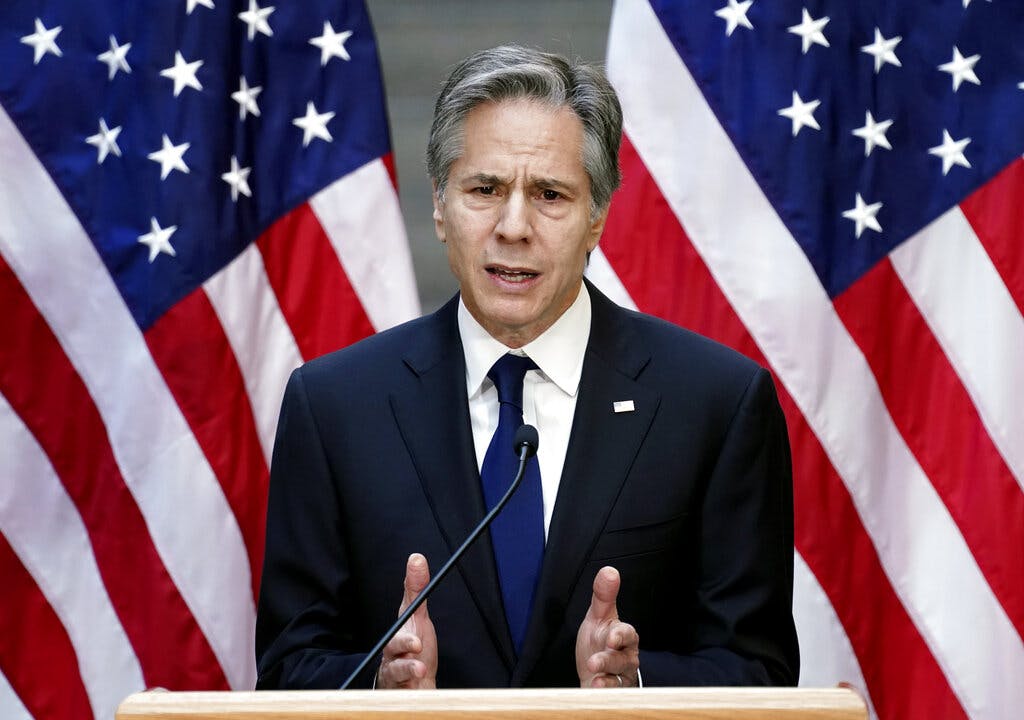Not So Great Expectations: Blinken Warns ‘We’re Not There’ on an Iran Deal
Since last fall President Biden’s envoys have been negotiating with Tehran diplomats — through European and Russian intermediaries — to revive the articles of appeasement the Obama administration agreed to in 2015.

Secretary of State Blinken, in the face of at least 15 House Democrats making public their opposition to the renewal of the Iran deal, is moving to lower expectations for a successful completion of an agreement with the ayatollahs.
In a press conference on Capitol Hill this morning, centrist Democrats, led by Congressman Josh Gottheimer of New Jersey and Congresswoman Elaine Luria of Virginia, said they would oppose various aspects of the deal.
Since last fall President Biden’s envoys have been negotiating with Tehran diplomats — through European and Russian intermediaries — to revive the articles of appeasement the Obama administration agreed to in 2015.
There is a “spectrum” of concerns over those negotiations among members of the group, Ms. Luria said at the press conference. Some members, she said, are merely “concerned,” while others fully oppose re-entering the deal known as the Joint Comprehensive Plan of Action.
Mr. Gottheimer said he understood any deal would be open to congressional review. Yet Ms. Luria said she was getting “mixed messages” from the administration as to whether the 2015 Iran Nuclear Agreement Review Act, which would require Congress to be permitted to review details of any deal with Iran, would be in effect now.
While the press conference was taking place, Mr. Blinken, who supervises the negotiation team led by the Iran envoy, Robert Malley, was raising new doubts about even the possibility of a new deal.
“I’m not overly optimistic at the prospects of actually getting an agreement to conclusion, despite all the efforts we put into it,” Mr. Blinken told Andrea Mitchell of MSNBC. “Time is getting extremely short,” he added. “I continue to believe it would be in the best interests of our country if we can get back into compliance with the deal, if Iran will do the same,” but “we’re not there.”
The teams that have been negotiating in Vienna since last fall have been called back to their capitals after Iran and Russia kept pressing new demands to return to the JCPOA. Most recently Tehran demanded the removal from the State Department’s terorism list the leading Iranian terrorism organization, the Islamic Revolutionary Guard Corps.
Tehran also asked for a guarantee that a future administration in Washington would not leave the deal, as President Trump did in 2018. As details of ever-more-brazen Iranian demands emerge from the secretive Vienna negotiations, Mr. Biden finds it difficult to maintain, even among Democrats, support for a possible pact.
“The more news about how bad the deal could be, the greater the potential for a change in America’s domestic coalition that would have supported an agreement along previous partisan lines,” the Foundation for the Defense of Democracy’s Iran watcher, Behnam Ben Taleblu, says.
Opposition is also growing far beyond Washington. Mr. Blinken is proud that the diplomacy is conducted in “close coordination with the Europeans, with the European Union, with France, with Germany, with the U.K.” Yet, America’s traditional allies in the Mideast — the ones actually threatened by Iran — are increasingly disillusioned with the idea of a return to the JCPOA.
“We want an agreement that has no expiration date,” Israel’s defense minister, Benny Gantz, told foreign ambassadors in Israel today. With Foreign Minister Yair Lapid by his side, Mr. Gantz added that Israel could live with “a deal that wouldn’t give Iran legitimacy to advance in the nuclear program that follows, with extensive oversight anywhere and anytime, and oversight of the ballistic missiles that Iran is developing.”
None of those conditions were included in the original JCPOA, and the new agreement is widely reported to include even fewer demands than the 2015 deal. JCPOA restrictions are set to expire in less than a decade. According to Mr. Gantz a “plan B” must be developed — including “to use force, to exert economic pressure, to exert political pressure.”
Yet it increasingly seems that Mr. Biden is preparing to either agree to a flawed deal or — as plan B — to “contain” a nuclear Iran or tolerate an Iran that can become a nuclear state once it decides to do so. In either scenario, the Islamic Republic’s influence and power in the region is bound to increase, as is the danger of an all-out Mideast war.
Defenders of Mr. Biden’s negotiators — which include team members that negotiated the JCPOA under President Obama — have long blamed the recent Iranian nuclear advance on President Trump’s decision to replace the deal with a policy of “maximum pressure.”
The timeline shows otherwise, though, as most of the advances Iran made in uranium enrichment, up to a near-bomb level, have occurred since the start of 2021. The reason for the discrepancy is that while deal supporters and detractors in Washington base their arguments on diplomatic minutiae, the Tehran regime bases its policies on hatred of America, Israel, and Sunni Arab neighbors.
“In Washington, the deal is everything; in Tehran it’s nothing,” Mr. Ben Taleblu says.
For now, though, detractors of Mr. Biden’s diplomacy include a fresh group of House Democrats. They join Republicans and Democrats like the chairman of the Senate’s Foreign Relations Committee, Robert Menendez, and Senator Ben Cardin. That is the context in which Mr. Binken is seeking to lower expectations that a deal is near.

